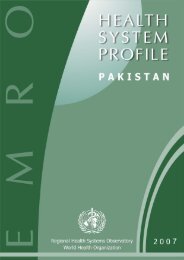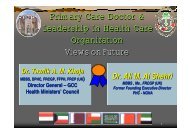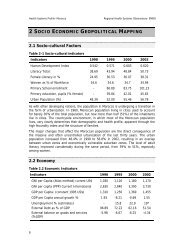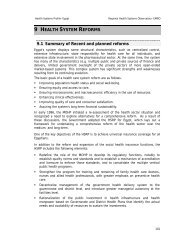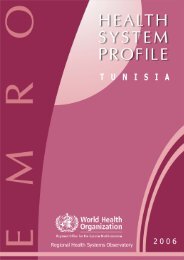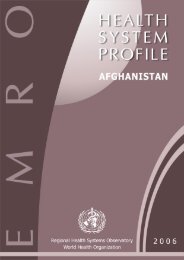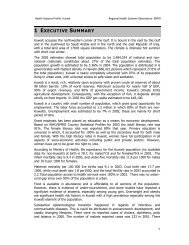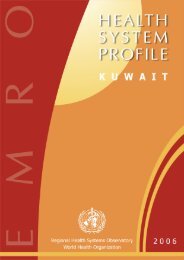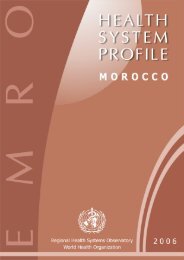Social determinants of health in countries in conflict - What is GIS ...
Social determinants of health in countries in conflict - What is GIS ...
Social determinants of health in countries in conflict - What is GIS ...
You also want an ePaper? Increase the reach of your titles
YUMPU automatically turns print PDFs into web optimized ePapers that Google loves.
18 <strong>Social</strong> <strong>determ<strong>in</strong>ants</strong> <strong>of</strong> <strong>health</strong> <strong>in</strong> <strong>countries</strong> <strong>in</strong> <strong>conflict</strong><br />
tensions and contribute to the political fragmentation <strong>of</strong> peoples who, <strong>in</strong> pre-<strong>conflict</strong><br />
times, saw themselves primarily as “citizens” [27].<br />
Other factors that threaten human security <strong>in</strong> the Region have been associated with<br />
the tensions <strong>of</strong> accelerat<strong>in</strong>g urbanization, and the large proportion <strong>of</strong> young people who<br />
need education, <strong>health</strong> care, jobs and opportunities for family formation [25].<br />
Conflicts provide opportunities for <strong>in</strong>tervention by foreign governments fight<strong>in</strong>g<br />
wars by proxy as part <strong>of</strong> the “war on terror”, or by actual occupation. They also provide<br />
opportunities for transnational companies <strong>in</strong>volved <strong>in</strong> oil and armaments, and the<br />
recruitment <strong>of</strong> mercenary soldiers. Often, participants <strong>in</strong> the <strong>conflict</strong> accuse aid workers<br />
<strong>of</strong> political <strong>in</strong>volvement. Th<strong>is</strong> challenges the pr<strong>in</strong>ciples <strong>of</strong> “operational neutrality and<br />
<strong>in</strong>dependence” that are supposed to protect humanitarian workers <strong>in</strong> a <strong>conflict</strong> sett<strong>in</strong>g.<br />
When security worsens, the departure <strong>of</strong> non-local representatives <strong>of</strong> nongovernmental<br />
organizations and multilateral organizations leaves local aid workers <strong>in</strong> an exposed<br />
position [28].<br />
3.2 Protect<strong>in</strong>g civilians <strong>in</strong> <strong>conflict</strong> sett<strong>in</strong>gs<br />
In the various forms <strong>of</strong> <strong>in</strong>ternal <strong>conflict</strong> experienced <strong>in</strong> <strong>countries</strong> <strong>of</strong> the Region,<br />
civilians are victims <strong>of</strong> forms <strong>of</strong> violence which violate basic human rights. Occupy<strong>in</strong>g<br />
powers have a legal obligation to respect the rights <strong>of</strong> civilians <strong>in</strong> occupied territories<br />
[9]. The 1949 Geneva Conventions apply to “war” and combatants and civilians caught<br />
up <strong>in</strong> war. More recent protocols are designed to “protect the victims <strong>of</strong> modern military<br />
<strong>conflict</strong>s”. In such situations, it <strong>is</strong> unlikely that combatants would avoid <strong>in</strong>jur<strong>in</strong>g or<br />
kill<strong>in</strong>g civilians. Attacks on civilians are illegal if they are def<strong>in</strong>ed as “<strong>in</strong>tentional”,<br />
“<strong>in</strong>d<strong>is</strong>crim<strong>in</strong>ate” or “d<strong>is</strong>proportionate”. The Fourth Geneva Convention, Article 18,<br />
states that “Civilian hospitals organized to care for the wounded and sick, <strong>in</strong>firm and<br />
maternity cases, may <strong>in</strong> no circumstances be the object <strong>of</strong> attack, but shall at all times be<br />
respected and protected by the Parties to the <strong>conflict</strong>.” [29] The acceptance by the UN<br />
<strong>of</strong> the “responsibility to protect” <strong>in</strong> cases <strong>of</strong> genocide, war crimes, ethnic cleans<strong>in</strong>g and<br />
crimes aga<strong>in</strong>st humanity was accepted at the 2005 World Summit and endorsed by the<br />
Security Council <strong>in</strong> April 2006 [3].<br />
Human rights are grounded <strong>in</strong> ethical demands that ex<strong>is</strong>t without necessarily be<strong>in</strong>g<br />
supported by leg<strong>is</strong>lation, as stated by Amartya Sen, whose work on a theory <strong>of</strong> human<br />
rights has <strong>in</strong>fluenced the stance <strong>of</strong> the Comm<strong>is</strong>sion on <strong>Social</strong> Determ<strong>in</strong>ants <strong>of</strong> Health<br />
[6]. Organizations such as Amnesty International, Human Rights Watch and Physicians<br />
for Human Rights document violations <strong>of</strong> civilian rights, and the serious and deliberate<br />
deprivations that can be def<strong>in</strong>ed as “war crimes” and “genocide”. Afghan<strong>is</strong>tan has an<br />
<strong>in</strong>dependent human rights comm<strong>is</strong>sion which courageously reports on violations <strong>in</strong> that<br />
country [30]. Such evidence can be used as the bas<strong>is</strong> for legal action or for humanitarian<br />
<strong>in</strong>tervention.<br />
SDH-chapters-<strong>countries</strong> <strong>in</strong> <strong>conflict</strong>-7 Oct.<strong>in</strong>dd 18 08/10/2008 14:24:49








